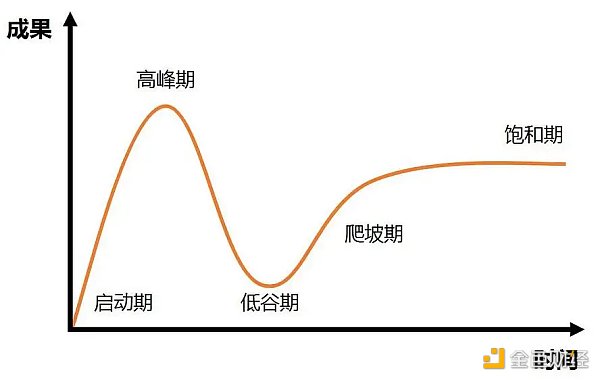Why is no one talking about ‘blockchain’ now?
Why is 'blockchain' being ignored?Author: Mu Mu, Plain Language Blockchain
In 2019, blockchain was selected as one of the top ten popular words of the year. Just like AI this year, blockchain was once “hot” and even considered synonymous with “craziness”. Today, we suddenly find that domestic media and people around us mention “blockchain” less and less, and even some encryption enthusiasts admit that they have a “resistant feeling” when they see these three words…
Has blockchain cooled down and been abandoned? Many people have this question now. So, what has blockchain experienced over the years? What is its current state?
01 “Blockchain”! Why is it no longer “blockchain”?
- Decoding Intent Revolutionizing the Web3 User Experience and Blockchain Order Flow
- An Overview of Coinlist’s Upcoming Native Cross-Chain DEX Chainflip Mechanism, Features, and Token Economy
- Celestia Researcher Interpreting 4 New Rollup Solutions
It is obvious that the popularity of blockchain has declined. The saying goes, “When heaven wants to destroy someone, it first makes him mad.” For a long time, many people even equated blockchain with the “crazy” Bitcoin. Currently, we are in a bear market for cryptocurrencies, so people think that blockchain is “burdened” and they blame its “cooling” on this situation, which seems reasonable. However, the current “cooling” of blockchain may not be the same as what people think.
A classic Gartner Technology Hype Cycle can well illustrate the position of the once popular blockchain concept.

In the short cycles of recent years, if 2017 and 2018 were the peak period after the blockchain concept was proposed, then the bear market of cryptocurrencies in 2019 and 2020 is its period of underestimation. It is a state of being ignored and hardly discussed. At that time, the impression of “blockchain” was even cooler than it is now. A well-known investor even expressed his disgust when hearing those words on his social media.
Later, the DeFi Summer in 2020-2021 brought it into the period of recovery. During this time, people woke up from underestimation and discovered more application value, so they began to explore more possibilities.
Technological development is often complex, especially in this ever-changing era. It is difficult to fully describe the current state of blockchain with just one Gartner chart. The Gartner curve is also not static, and its ultimate direction will change due to various influencing factors.
From a developmental perspective, as one of the most important technical solutions for public chains, blockchain is naturally closely related to public chains. In the past few years, when people and market funds focused on public chain technology, various optimization solutions including blockchain scalability and consensus mechanisms became the focus of discussion.
Nowadays, the emergence of a group of high-performance public chains and Layer2 scaling solutions has eliminated the technical bottleneck of public chains. The ecological barrier of public chains, represented by Ethereum, is also becoming deeper. Public chains, which are the most important infrastructure of blockchain, have almost settled down, and the window for new public chains is closing.
With the increasing popularity of concepts such as DeFi, Web3, NFT, and metaverse in recent years, we have seen the emergence of some phenomenal Web3 applications, attracting more and more attention. People have begun to realize that we are entering the era of the next generation of internet applications, and for ordinary users, they don’t need to deeply understand the underlying protocols of blockchain, which is difficult to comprehend. Therefore, blockchain is stepping out of the spotlight and going behind the scenes.
Let’s take a simple example. In the years when PCs became popular, the biggest piece of cake for the capital market was the “operating system” market for infrastructure. Most people at that time were discussing whether to install Windows, Linux, or buy Apple computers. Many domestic operating systems were once “impressive”.
Various technical teams continuously developed innovative operating systems to solve the problems of previous products and join the competition. Later, as time went on, Microsoft and Apple’s operating systems became more and more mature through iterations. They established their own powerful application ecosystems and defeated most of their competitors to occupy market share. After that, there were very few new operating systems joining the competition, and people shifted their focus to various application software running on the operating systems.
Nowadays, people have also forgotten the discussions about which PC operating system is user-friendly, smooth, and crash-free. Blockchain is the same. It has stepped out of the spotlight and is hidden in the background, but it is not “dead”.
02 Does blockchain still have anything to do with ordinary people?
With “blockchain” stepping out of the spotlight, ordinary people may hear less about this word in the future, but it does not mean that blockchain has nothing to do with ordinary people in the future. Just like PC operating systems, even if they step out of the spotlight, people still need to use various applications based on them every day and cannot completely rely on the environment provided by the operating systems. The next generation of the internet cannot do without the foundation of blockchain. When people operate Web3 applications and enter the metaverse, blockchain is playing a role, guarding our information and assets, ensuring their security and inviolability.
For ordinary users, although concepts such as “account abstraction” proposed by the crypto community will simplify seemingly complex wallet operations, for example, future Web3 users can verify their identities when entering applications using methods such as email and text messages, just like traditional internet users. They don’t need to keep their private keys themselves and can lower the user threshold through solutions such as social recovery.
Although ordinary users may not need to know what blockchain is in many cases, “convenience” is often achieved by sacrificing security and decentralization. If you really want to securely manage your encrypted assets and identity and pursue a high level of security, it is important to have a basic understanding of the principles and secure use of blockchain asset wallets.
For ordinary investors, based on the basic principle of “don’t invest if you don’t understand”, even if future market hotspots are all about applications, understanding the underlying blockchain technology can still have a significant impact on decision-making directions and opportunity exploration. After all, the concepts, intentions, and basic principles brought by blockchain technology are the main reasons why most cryptographic projects can come to where they are today.
In addition, one important reason why Bitcoin, Ethereum, and other cryptocurrencies are called public blockchains is that everyone can participate and supervise together. Public chains also rely on the consensus support of users scattered around the world. 03 Conclusion
The blockchain has indeed “cooled down,” but this is different from what some people understand. It has moved from the forefront to the background, from the madness when the concept was proposed to the silent support of the underlying technology after the application landed, completing a magnificent transformation. The future of blockchain will be closely related to the large-scale landing of the next generation of internet applications and our lives.
We will continue to update Blocking; if you have any questions or suggestions, please contact us!
Was this article helpful?
93 out of 132 found this helpful
Related articles
- Losses of over $50 million A comprehensive analysis of the cascade attack event caused by the programming language Vyper malfunction.
- Arthur Hayes In the future, humans will collaborate with AI through DAO.
- Opinion Block space is a commodity, and the growth trajectory of blockchain networks is similar to that of telecommunications networks.
- Exploring Sidechains and Rollups Differences and Similarities in Architecture, Security Assurance, and Scalability Performance
- How to understand the playability of blockchain games?
- Wall Street banks will establish their own blockchain and cross-chain stablecoin.
- Blockchain-based lending AAVE protocol simplifies DeFi






